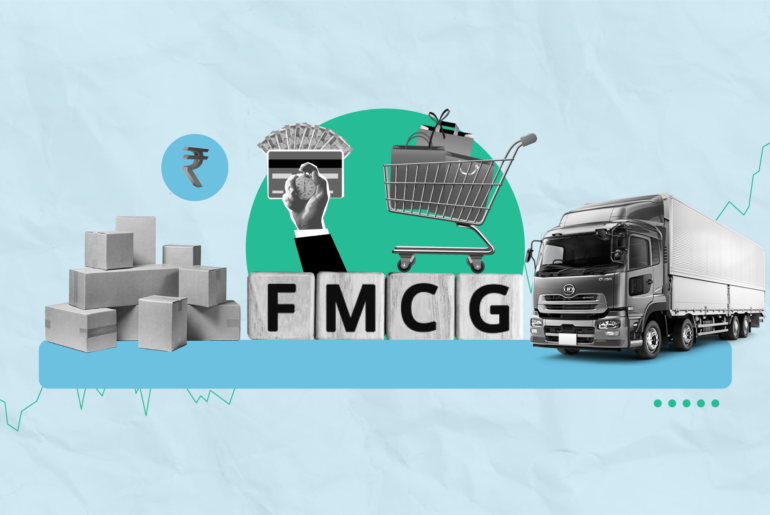Last Updated on Dec 4, 2024 by Aishika Banerjee
FMCG (Fast-Moving Consumer Goods) stocks play a crucial role in both everyday life and the financial markets. Known for their steady demand, FMCG products include essential items like food, beverages, personal care, and household goods, which are staples across the globe. For investors, FMCG stocks are often a go-to for stability, especially in markets like India, where consumer demand remains robust. In this article, let’s explore all the listed FMCG companies in India, along with benefits, risks, how to invest, future projections, and more.
Table of Contents
Listed FMCG Companies in India (2024)
Here is a Nifty FMCG stocks list of all the FMCG stocks from all the FMCG sectors in Nifty 500
| Name | Sub-Sector | Market Cap (Rs. in cr.) | Close Price (Rs.) | PE Ratio | Net Income (Rs. in cr.) | Net Profit Margin (%) |
| ITC Ltd | FMCG – Tobacco | 591,198.41 | 472.55 | 28.90 | 20,458.78 | 27.78 |
| Hindustan Unilever Ltd | FMCG – Household Products | 583,368.27 | 2,482.85 | 56.76 | 10,277.00 | 16.34 |
| Nestle India Ltd | FMCG – Foods | 218,063.42 | 2,261.70 | 55.45 | 3,932.84 | 15.53 |
| Godrej Consumer Products Ltd | FMCG – Personal Products | 125,876.00 | 1,230.45 | -224.56 | -560.55 | -3.90 |
| Britannia Industries Ltd | FMCG – Foods | 118,256.70 | 4,909.60 | 55.27 | 2,139.81 | 12.60 |
| Dabur India Ltd | FMCG – Personal Products | 92,612.32 | 522.55 | 50.26 | 1,842.68 | 14.30 |
| Marico Ltd | FMCG – Personal Products | 83,021.76 | 641.70 | 56.06 | 1,481.00 | 13.18 |
| Colgate-Palmolive (India) Ltd | FMCG – Personal Products | 78,773.84 | 2,896.25 | 59.51 | 1,323.65 | 22.99 |
| Procter & Gamble Hygiene and Health Care Ltd | FMCG – Personal Products | 51,670.35 | 15,917.80 | 76.55 | 675.02 | 15.85 |
| Adani Wilmar Ltd | FMCG – Foods | 40,757.92 | 313.60 | 275.43 | 147.98 | 0.29 |
| Gillette India Ltd | FMCG – Personal Products | 31,970.33 | 9,811.30 | 77.65 | 411.70 | 15.48 |
| Godfrey Phillips India Ltd | FMCG – Tobacco | 29,646.76 | 5,701.30 | 33.57 | 883.03 | 18.28 |
| Emami Ltd | FMCG – Personal Products | 27,931.64 | 639.90 | 38.61 | 723.51 | 19.96 |
| Bikaji Foods International Ltd | FMCG – Foods | 20,123.22 | 803.70 | 75.73 | 265.71 | 11.27 |
| Cello World Ltd | FMCG – Household Products | 18,051.83 | 817.25 | 54.53 | 331.06 | 16.35 |
| Jyothy Labs Ltd | FMCG – Household Products | 15,125.32 | 411.90 | 40.94 | 369.45 | 13.14 |
| Honasa Consumer Ltd | FMCG – Personal Products | 8,500.64 | 261.70 | 76.05 | 111.77 | 5.67 |
Note: The data in this FMCG sector share list of all FMCG companies in India in Nifty 500 is from 4th December 2024. To get this list of FMCG companies in India on the Tickertape Stock Screener, apply the below-mentioned filter.
- Sector > Consumer Staples > FMCG – Foods, FMCG – Household Products, FMCG – Personal Products, FMCG – Tobacco
To get the list of the top 10 FMCG companies in India, click here.
🚀 Pro Tip: Use Tickertape’s Portfolio Analysis to assess your investment portfolio’s diversification and performance.
What are FMCG Stocks?
FMCG full form is Fast Moving Consumer Goods. FMCG stocks represent shares in companies that produce and sell non-durable, frequently consumed items. Products in this category include basic food items, toiletries, cosmetics, and other essentials that have a high turnover. Examples of FMCG companies like Nestle, Hindustan Unilever, and ITC are key players, regularly topping the list of leading FMCG stocks due to their wide distribution networks and consistent product innovation.
Features of FMCG Stocks
- Steady Demand: FMCG goods are consumed regularly, regardless of economic conditions. This creates a reliable revenue stream for companies in this sector.
- Strong Brand Value: Top FMCG companies often have Indian FMCG brands that are household names, fostering customer loyalty.
- Resilience in Economic Downturns: FMCG stocks tend to be less affected during economic slowdowns as their products are everyday necessities.
- High Dividend Yields: Many FMCG brands in India, like Nestle and ITC, are known for rewarding shareholders with consistent dividends.
How to Find the Best Food Industry Stocks For Your Portfolio?
Now, if you are considering analysing or investing in FMCG stocks, the question is how do you find the consumer stocks that suit your portfolio needs? Well, to invest in any stock, a thorough analysis is required. For this purpose, Tickertape provides you with comprehensive research, analysis, and investing tools. With Tickertape Stock Screener, you can list stocks based on your preferred criteria. There are over 200 filters for you to choose from, along with pre-built screens, which make your analysis faster.
Further, the Scorecard on every asset page helps you dive deeper into the stock and analyse the stock based on quantitative factors such as profitability, performance, entry and exit points, valuation, and growth and provides a sneak peek into the potential red flags in the stock.
Research, analyse, and invest quicker than before, because #TickertapeHaiNa! Become a Pro Member now!
In case you are looking for ‘Best FMCG Stocks in India’, read this article.
How to Invest in Indian FMCG Stocks?
- Direct Equity Investment: You can purchase shares of FMCG companies, including new FMCG companies in India, listed on the Bombay Stock Exchange (BSE) or the National Stock Exchange (NSE).
- Mutual Funds and ETFs: Investing in funds that track the Nifty FMCG Index offers diversified exposure to the top 50 FMCG companies in India.
- Systematic Investment Plans (SIP): This method spreads your investment over time, reducing risk and taking advantage of market volatility.
Benefits of Investing in FMCG Stocks
- Consistent Returns: FMCG sector stocks have historically provided stable returns, making them a favourite for conservative investors.
- Inflation Hedge: As the prices of essential goods generally increase with inflation, FMCG listed companies in India can often maintain or even improve profit margins.
- Defensive Investment: The FMCG sector is less susceptible to economic downturns, offering a defensive option for portfolio diversification.
Risks of Investing in FMCG Stocks
- High Valuations: FMCG stocks often trade at premium valuations, which could pose risks for even the top 20 FMCG companies in India if growth slows down.
- Competition and Regulatory Challenges: The sector faces intense competition and is heavily regulated, affecting profit margins of even the top 20 FMCG stocks in India.
- Vulnerability to Raw Material Costs: Fluctuations in the cost of raw materials, like agricultural products, can impact earnings.
Overview of the FMCG Industry in India
FMCG refers to the products that are high in demand, affordable and sold quickly. They are quick to move out of the store. Hence the name ‘fast-moving’. People use these products on a daily or regular basis. It includes toothpaste, soaps, detergents, oil, shampoo, beverages, beauty products, personal care products, and more.
The Indian FMCG industry is categorised into three broad sectors – food and beverages, household and personal care, and healthcare.
Future Projections of the Indian FMCG Industry
- FMCG companies anticipate growth in 2024 based on various factors:
- Commodity inflation expected to keep product prices stable.
- Hopes for a favourable monsoon to boost rural growth.
- The ongoing trend of premiumisation is likely to sustain urban growth.
- In 2023, challenges included lower festive demand, inadequate rainfall affecting rural growth, unseasonal weather impacting beverage and ice-cream sales, and inflationary pressures deterring rural customers.
- Domestic FMCG sales saw a 9% YoY increase in September 2023, primarily led by urban markets, with rural markets still on the path to recovery.
- Kirana channel sales, constituting 80% of FMCG business, faced challenges during the festive season, particularly in categories like beauty, cosmetics, chocolate, and confectionery.
- A study by CII and Boston Consulting Group highlighted that supply-side improvements and expanding the consumer base could help overcome rural consumption challenges caused by inflation and weather uncertainty.
- Companies are focusing on expanding their direct retail reach in rural areas, promoting affordable packs, increasing innovation, and reducing inventory pressure in stores.
- Key contributions to FMCG volume change include packaged noodles (78%), biscuits (67%), and insecticides (64%).
- The Indian online grocery market is expected to exceed sales of about $17.12 bn by 2026, at a CAGR of 28.99%.
Frequently Asked Questions (FAQs) About FMCG Stocks
1. What is FMCG?
FMCG, or Fast-Moving Consumer Goods, refers to products that are sold quickly and usually at a low price, such as food and household items.
2. What are some of the top FMCG companies in India?
The top 5 FMCG companies in India based on market cap are:
– ITC Ltd
– Hindustan Unilever Ltd
– Nestle India Ltd
– Godrej Consumer Products Ltd
– Britannia Industries Ltd
This FMCG company list is as of 4th December 2024.
3. Why are FMCG stocks considered defensive?
FMCG stocks are considered defensive because they produce essential goods, which can lead to consistent demand even during economic downturns.
4. How is the FMCG sector performance measured?
The FMCG sector’s performance is often measured using the Nifty FMCG Index, which tracks major FMCG companies in India, including some of the best FMCG companies in India.
5. What are key financial metrics for analysing FMCG stocks?
Metrics like dividend yield, P/E ratio, and sales growth are crucial. For example, a high dividend payout ratio is common in established consumer companies in India.
Explore other popular stock collections on Tickertape –
Here’s are some of the popular stock collections across different sectors in India:




